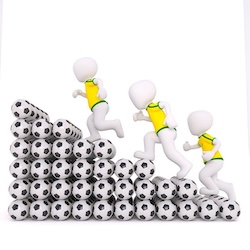"Start writing, no matter what. The water does not flow until the faucet is turned on."
~ Louis L’Amour
There’s no question about it. If you want to have success as a writer, you have to keep writing.
That sounds simple enough, but it’s not the whole issue. For instance, you have to know what you’re going to write, and have a system of working so that you can get straight down to work as soon as you sit down.
Productivity is always a hot topic, especially for writers.
One of the best known productivity hacks was Ivy Lee’s Success 6 method of getting more done.
The story goes that in 1918, Charles Schwab was one of the richest men in the world. He was the president of the Bethlehem Steel Corporation which was one of the largest ship builders and the second-largest steel producers in America at the time. Schwab was known as a master hustler who was constantly looking for ways to have an edge over his competition.
In 1918 he was looking for a way to increase efficiency of his team and find better ways to get things done. To this end, he arranged a meeting with Ivy Lee who was a respected productivity consultant.
Ivy Lee told Charles Schwab that all he was going to do was talk for 15 minutes to each executive of the company and give them simple instructions. Charles Schwab asked how much this was going to cost him. Ivy Lee said it would cost nothing in the beginning but that if his method worked, then Schwab could pay him whatever he thought it was worth.
What Was The Method?
Ivy Lee then met with each of the company executives and told them a simple daily routine that they had to follow.
He told them, that at the end of each day they were to write down the 6 most important things they needed to accomplish the next day. But only 6 and no more. Once they had their list they were to number them in order of importance. He said, tomorrow, do the first thing, number one on the list, then work through the list in order. At the end of each day, move any unfinished tasks to a new list of 6 for the next day, and repeat this every working day.
After three months, Charles Schwab gave Ivy Lee a cheque for $25,000, which was a lot of money in 1918.
Why Did This Method Work?
Ivy Lee’s method of prioritising was simple yet effective, and made it easy with a short list of only 6 priorities each day.
Warren Buffett had a similar method which he called his 5/25 Rule for achieving success in life. His rule was to list 25 life priorities. They could be anything you want to achieve in life, including career, personal growth, relationships, health, or financial prosperity or anything else you want to do.
You then go through your list and pick out THE 5 most important things you want to achieve first, and concentrate only on them and forget about the other 20 completely until you had fulfilled your first 5.
Both these productivity methods remove the friction of starting. It lets you know what you have to do first, which means you can get straight down to work by minimises what you need to concentrate on.
Fewer priorities leads to doing better work because it enables you to focus, knowing that everything important will get done.
And doing the most important thing first every day is all you need towards consistency and focus.
What are your six important things to do today?





